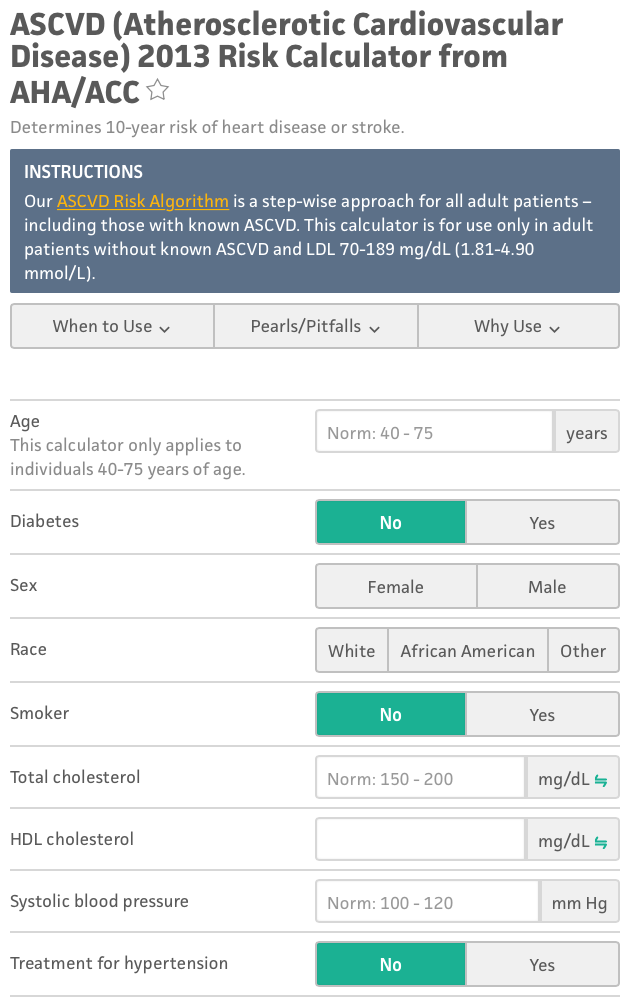Session Information
Date: Sunday, November 10, 2019
Title: Measures Of Healthcare Quality Poster I: Testing, Screening, & Treating
Session Type: Poster Session (Sunday)
Session Time: 9:00AM-11:00AM
Background/Purpose: Evidence suggests that the tools used for cardiovascular disease (CVD) risk assessment in the general population underestimate the true risk when they are applied to patients with proatherogenic diseases such as RA, SLE and PsA. High inflammatory state increases atherogenesis and myocardial microvascular abnormalities leading to increased morbidity and mortality risks from cardiovascular (CV) causes. EULAR recommends that it is the rheumatologist who should ensure that CV disease risk assessment and management are performed regularly.1
Hispanic population has been underrepresented in the CV risk assessment research. We aimed to identify the RA, SLE and PSA patients’ CV risk in clinic with predominantly underserved Hispanic patient population using the Atherosclerotic Cardiovascular Disease (ASCVD) calculator as recommended by the American Heart Association and American College of Cardiology. ASCVD 10-year-risk score of ≥5% is the recommended threshold for statin consideration/initiation. LDL >70 in a diabetic or LDL >190 in a nondiabetic are additional recommendations for statin treatment regardless of the ASCVD 10-year-risk score.2
Methods: RA, SLE and PsA patients were assessed during routine follow up visits from 1/2019 to 6/2019. Rheumatology fellows identified patients over the age of 40 who did not have an established diagnosis of CV disease and not treated with lipid lowering therapy. We calculated the ASCVD score based on patients’ age, gender, ethnicity, smoking status, systolic blood pressure and antihypertensive treatment, lipid panel (total cholesterol, HDL) by using the MDCalc Medical Calculator App. The ASCVD score may also be obtained by going on www.mdcalc.com or tools.acc.org websites.
Results: The ASCVD score was calculated for 53 patients (32 RA, 16 SLE, 5 PsA). Out of these patients, 85% were Hispanic, 6% Caucasian, 7% African American, 2% Asian; 82% were females.We identified 7 (13%) out of 53 rheumatology patients who met the ASCVD criteria for statin initiation. Five (9%) patients had ASCVD score above >5%, 1 patient with diabetes had LDL >70 and 1 patient had LDL level >190. The patients with elevated ASCVD score were all over the age of 60 and carried the diagnosis of RA.
Conclusion: This abstract highlights the importance of CV disease screening in rheumatology clinic to identify patients with the highest risk for life-threatening CV events by calculating the ASCVD score. Thirteen percent of our 53 screened patients satisfied the criteria for statin initiation. Of interest, our study identified 7% of the Hispanic population with autoimmune diseases at risk for CV disease – a population frequently not included in cardiovascular risk assessment studies. Although we have a small sample size, this study demonstrates the ease and feasibility of performing CV risk assessment in clinical practice.
https://www.mdcalc.com/ascvd-atherosclerotic-cardiovascular-disease-2013-risk-calculator-aha-acc
Accessed June 4, 2019.
To cite this abstract in AMA style:
Gandrabur L, Kim W, Sen A, Nes D, Ash J, Wasserman A, Sperber K. Implementation of Cardiovascular Screening in Hispanic Patient Population with RA, SLE and PsA [abstract]. Arthritis Rheumatol. 2019; 71 (suppl 10). https://acrabstracts.org/abstract/implementation-of-cardiovascular-screening-in-hispanic-patient-population-with-ra-sle-and-psa/. Accessed .« Back to 2019 ACR/ARP Annual Meeting
ACR Meeting Abstracts - https://acrabstracts.org/abstract/implementation-of-cardiovascular-screening-in-hispanic-patient-population-with-ra-sle-and-psa/


